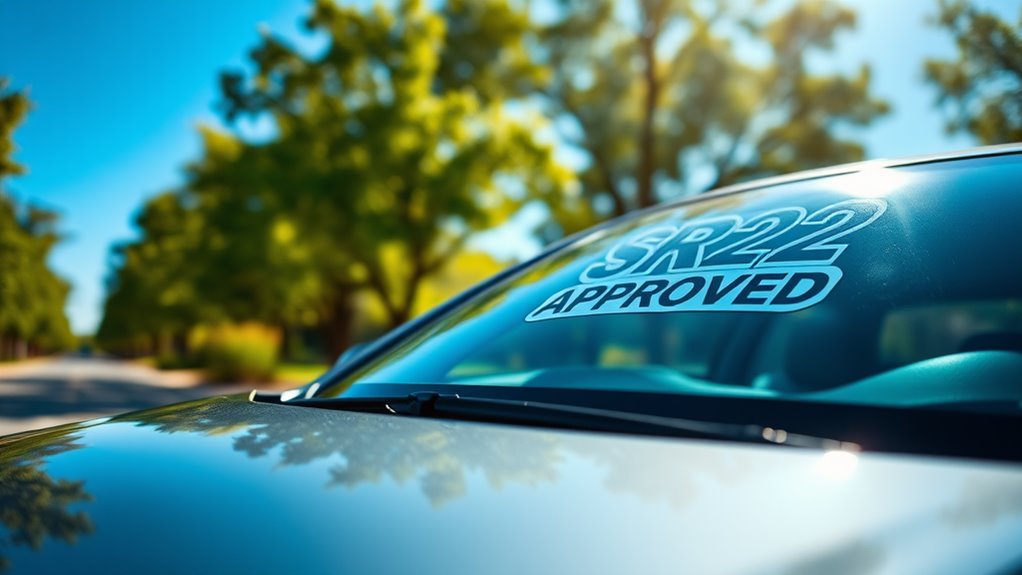Explore Advantages of SR22 Insurance Policies
If you're facing license reinstatement after serious traffic violations, SR22 insurance policies could be your solution. These policies serve as proof of financial responsibility, vital for regaining driving privileges. With options like Owner and Non-Owner SR22 policies, you can tailor your coverage to your needs. Furthermore, maintaining an SR22 may even help improve your future insurance rates. Understanding these advantages is vital—so what's the next step in steering your options?
Steering through the complexities of SR22 insurance policies can be challenging, especially after experiencing a serious traffic violation. Understanding the nuances of SR22 can considerably impact your ability to regain driving privileges. When you're required to file an SR22, it's important to grasp what it entails and the advantages it offers.
An SR22 isn't insurance in itself; rather, it's a form that demonstrates you meet your state's minimum auto liability insurance requirements. It's often mandated after serious offenses like driving under the influence (DUI) or driving without insurance. This filing is essential for reinstating your driving privileges after a license suspension. Typically, you'll need to maintain this filing for about three years, depending on your state's regulations.
The necessity of an SR22 arises from specific traffic violations. A DUI conviction, for instance, will almost always require you to file an SR22. Similarly, if you've been caught driving without insurance or have a history of repeat traffic offenses, you'll need an SR22 to get your license back. Some states have unique rules regarding when an SR22 is needed, so it's important to familiarize yourself with your state's requirements.
There are three primary types of SR22 policies: Owner, Operator (Non-Owner), and Owner-Operator certificates. An Owner SR22 applies if you own a vehicle, while a Non-Owner SR22 is ideal for those who don't own a car but still need to drive. This flexibility allows you to legally operate vehicles that belong to others, provided you have their permission. Understanding which type of policy suits your situation can help you navigate the insurance landscape more effectively.
The cost of SR22 insurance can be a concern, with the average monthly premium hovering around $206. If you've recently faced a DUI or similar serious offense, your premiums might be even higher. Additionally, most insurance companies charge a filing fee of about $25 when submitting your SR22 form. It's wise to shop around since rates can vary greatly among providers. Companies like USAA may offer competitive rates, making it worthwhile to explore your options. High-risk drivers often face higher premiums due to their classification, which can further strain their finances.
Maintaining an SR22 policy requires diligence. Your insurance company must file the SR22 form with your state's DMV, and it's crucial to keep your insurance coverage continuous. Any lapse in coverage could lead to further suspension of your driving privileges.
In addition, insurers are obligated to notify the DMV of any policy changes or cancellations, underscoring the importance of compliance with SR22 mandates.
Ultimately, an SR22 is necessary for reinstating a suspended or revoked license. It serves as proof of financial responsibility, enabling you to maintain your driving privileges. Failure to comply with SR22 requirements may result in additional penalties, including extended suspensions.
Understanding these aspects equips you to navigate your path back to legal driving with greater clarity and confidence. By staying informed about the requirements and implications of SR22 insurance, you're better positioned to make sound decisions as you work toward reinstating your driving privileges.
Conclusion
In summary, SR22 insurance policies offer essential support for those seeking to reinstate their driving privileges after serious violations. With options tailored to individual needs, these policies not only provide financial responsibility proof but can also improve future insurance rates. Notably, studies show that drivers with SR22 coverage are 25% more likely to maintain good driving records post-reinstatement. By committing to responsible driving, you can pave the way for a smoother return to the road.


